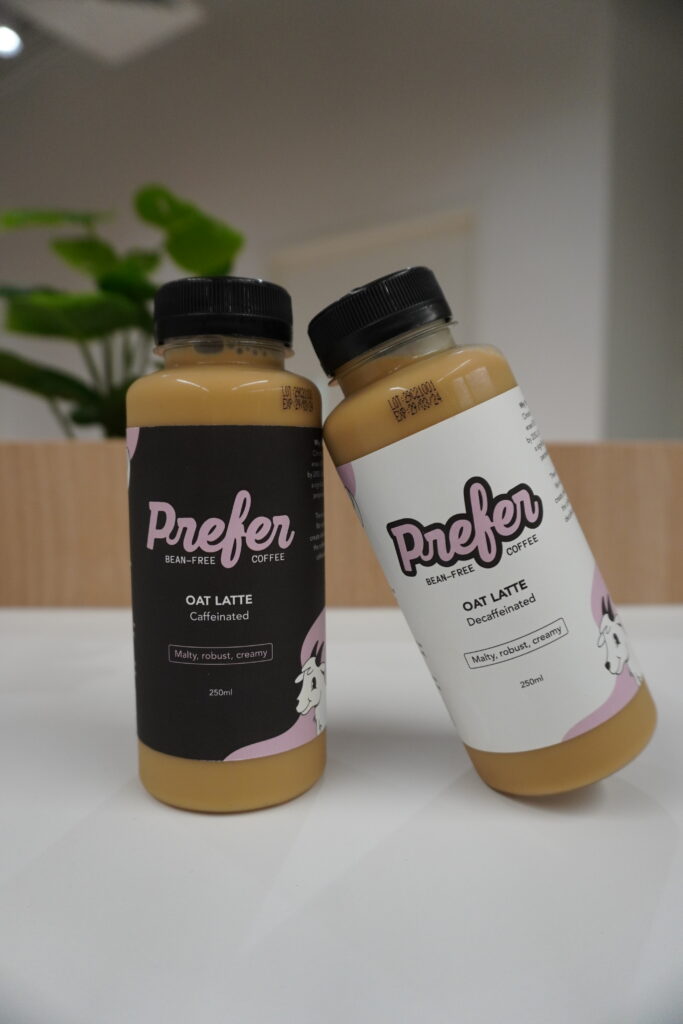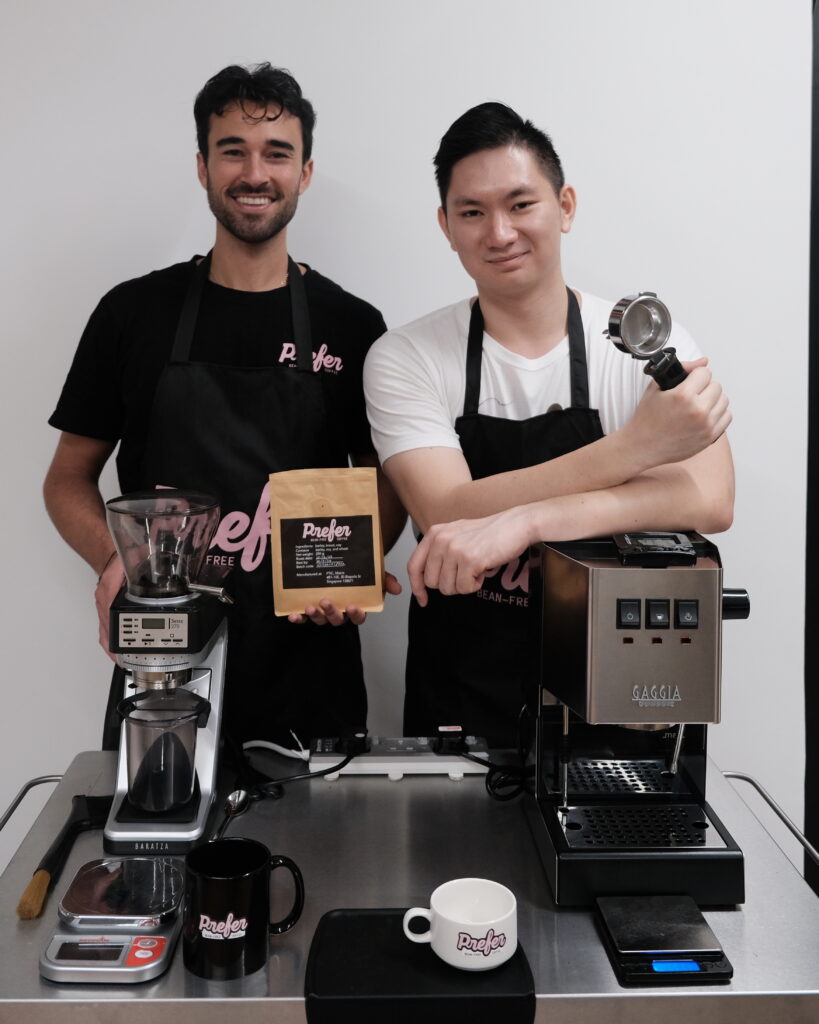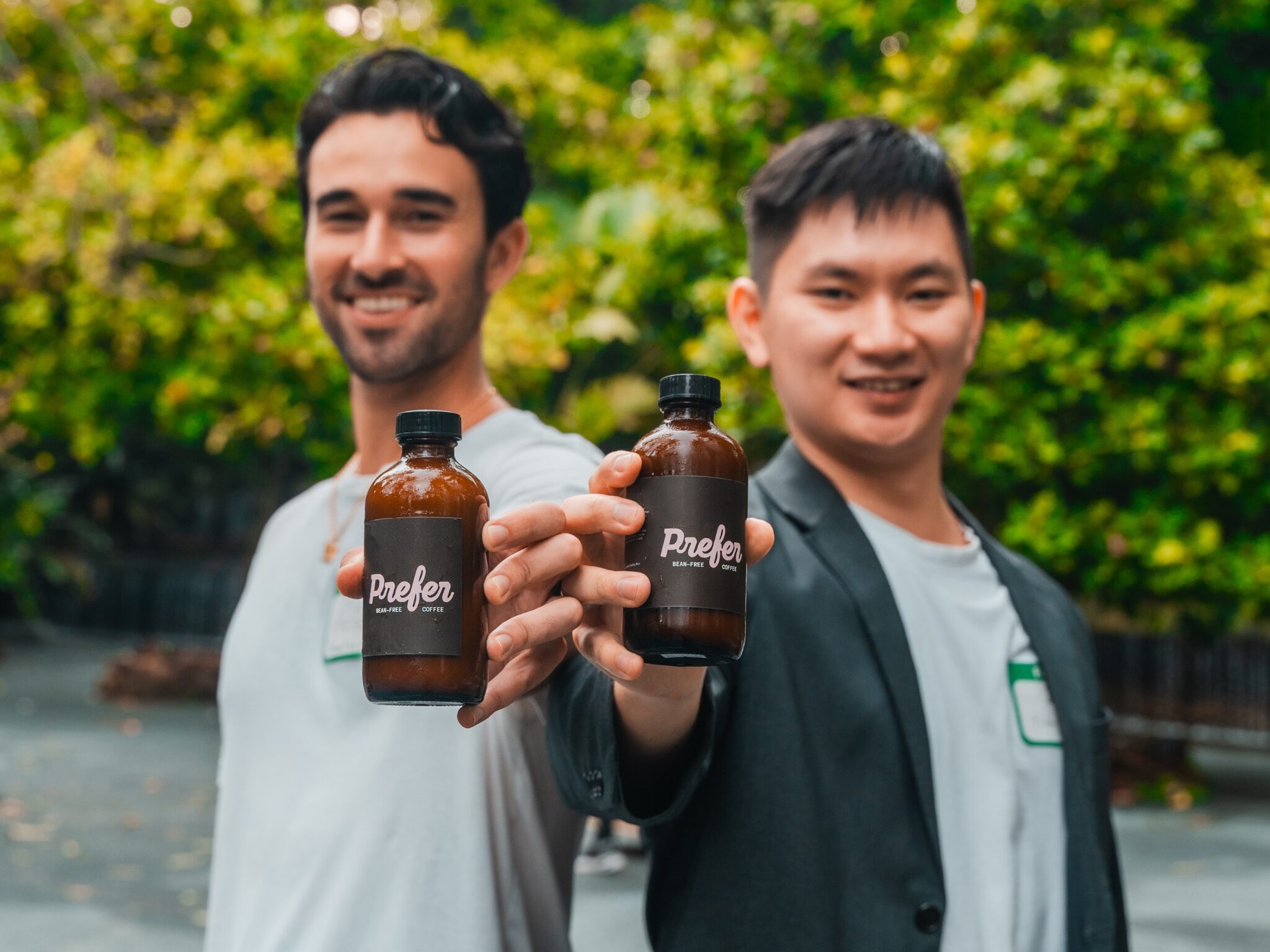Prefer Brews Up $2M in Seed Funding to Make Beanless Coffee from Surplus Bread, Soy Pulp & Spent Grain
5 Mins Read
Singaporean food tech startup Prefer, which makes beanless coffee from food industry sidestream ingredients, has raised $2M to fund a larger production facility and its Asia expansion.
How do you Prefer your coffee?
If you ask Jake Berber and Ding Jie Tan, it’s a cup of joe made from waste bread, soy milk pulp and spent brewer’s grain – but minus the arabica, thank you very much.
To convert you too, the pair founded their food tech startup Prefer in 2022, which has today announced a $2M seed funding round for its fermentation-derived beanless coffee product. “Our mission is to future-proof coffee from the impacts of climate change; we plan to create delicious, affordable, and sustainable coffee, forever. Today, we start as a climate-friendly option on the menu,” said Berber, the company’s CEO, who described Prefer as “the next generation of the commodity we know as coffee today”.
The investment was led by Forge Ventures, with participation from 500 Global, A*ccelerate, Better Bite Ventures, Sopoong Ventures, SEEDS Capital, Entrepreneur First and Pickup Coffee. “With a commitment to revolutionising the coffee industry by offering affordable and sustainable bean-free coffee, Prefer embodies the spirit of forward-thinking entrepreneurship we actively seek to support,” said Forge Ventures co-founder and partner Tiang Lim Foo.
Fermented coffee alternative: the how and the why

To make its coffee alternative, Prefer makes use of food industry byproducts, acquiring surplus bread from bakery company Gardenia, leftover pulp from tofu production from soy milk producer Mr Bean, and spent brewer’s grain from The 1925 Brewing Co. and Brewerks – all of which are local companies.
These ingredients then undergo a three-step process to produce essential aroma molecules found in coffee. “First, we ferment our raw ingredients with food-grade microbes,” explains Berber. “Next, we roast this fermented mixture. Finally, we grind it into coffee grounds and pack this for our customers. Our proprietary technology utilises the raw ingredients and converts them into the same key aroma volatiles we find in coffee.”
Tan, who is the chief technology officer, added: “Fermentation is as old as human civilisation and has been historically used to craft flavours, preserve ingredients as well as enhance nutrition content in foods. Through Prefer, we want to further its conventional use by leveraging cutting-edge science to create a line of sustainable flavours that’s accessible to everyone while conserving the environment.”
Here’s why it’s doing this: coffee as a crop is in trouble. Nearly 60% of all coffee species are endangered – including arabica, which could go extinct by the end of the century – while all arable land for growing these beans could be halved by 2080. Extreme weather would make climate hazards more frequent, meaning lower yields and higher prices for coffee.
The other side to this is that coffee cultivation is harmful to the environment. It trails only certain red meats and dark chocolate in terms of emissions per kg of product – in fact, it tops that list when looking at emissions per 1,000 kilocalories. There’s also a huge water footprint, with a single cup of coffee requiring 140 litres of water.
“That’s where Prefer comes in to ensure the production and price of coffee becomes sustainable and stable in the long run,” says Berber. While the company hasn’t conducted a life-cycle assessment, by Prefer’s calculations, its product has an estimated carbon footprint 10 times smaller than conventional coffee.
The startup claims its proprietary fermentation tech creates a coffee alternative that boasts the same aroma, tasting notes and brewing experience as a traditional brew. While it currently manufactures, processes and packages the beanless coffee in its laboratory – located within Nurasa’s Food Tech Innovation Centre – the new capital injection will help Prefer scale up production and enable its Asia expansion. “This involves building a larger production facility, growing the team, and increasing marketing efforts,” Berber told Green Queen.
Customising coffee’s caffeine content

Prefer is among a host of startups developing coffee alternatives. Northern Wonder (Netherlands), Atomo, Voyage Foods and Minus Coffee (all US) are a select few that are using a blend of ingredients to be turned into something similar to coffee. French startup Amatera, meanwhile, is using molecular biology to create coffee from plant cell cultures, and Israel’s Pluri is working on a cell-based version.
But what sets Prefer apart is its customisability. The startup, whose offerings include ground coffee for espresso machines and ready-to-drink bottles, can finetune caffeine levels based on its customers’ needs. In fact, some cafés in Singapore have already begun offering the startup’s alternative as the default decaf option – a sign of tremendous faith in the product – while others are planning to offer an extra buzzy brew with twice the amount of caffeine.
Currently, Prefer is available at 12 locations in the city state, including specialty coffee shops Dough and Foreword Coffee Roasters, as well as some SaladStop! outlets. Berber confirmed that its products will be in supermarkets in Q2 this year, while some “household name partnerships are brewing” as well, which will “showcase Prefer in fun and innovative formats”.
One concern you might have about Prefer’s solution is that it’s pre-ground coffee. With traditional coffee beans, grinding speeds up the oxidation process, which leaches out all the flavour compounds in the brew. Common wisdom suggests that it can take as little as 15 minutes to begin degrading, which is why industry experts suggest always buying whole-bean coffee and grinding freshly before brewing.
“Our ground coffee retains its flavours longer than traditional coffee,” reveals Berber, adding: “We do have plans to create whole beans, but this is not the focus right now.” Reflecting on his point about ensuring coffee prices remain stable, he notes that Prefer is offered “as a more affordable supply than our partners who use arabica beans”.
The startup’s next stop in its Asia-Pacific expansion journey is the Philippines. “Our product features are designed for the Southeast Asian palate, with our flavour profile and customisable caffeine content,” he says. “We are laser-focused in Asia until 2025; demand for coffee is growing at a rapid pace in Asia, and we believe we are the solution for a scarce coffee supply.”
Eventually, though, Prefer doesn’t just want to be an alternative coffee company. Thanks to its fermentation technology, there’s much more in the pipeline. “The ultimate goal of Prefer is to create a portfolio of natural, sustainable flavours, to supply the world’s demand for coffee, cacao, vanilla, hazelnuts, and more,” outlines Berber.
“All these ingredients are currently endangered by climate change. We believe that we can harness our proprietary fermentation platform to build a more sustainable, affordable, and delicious future of food.”




